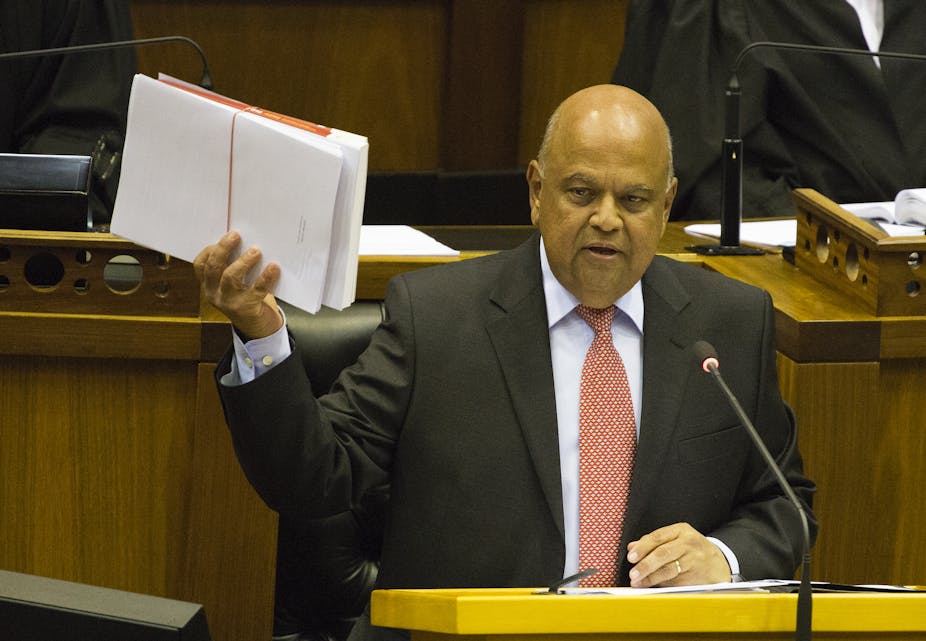South Africa’s finance minister Pravin Gordhan presented the country’s 2016 medium term budget amid rising economic challenges marked by low growth, a crisis in higher education funding and fears of state capture. The Conversation Africa business and economy editor, Sibonelo Radebe, asked Dr Co-Pierre Georg to interpret key points.
What is your reaction to the minister’s statements on funding higher education?
The minister allocated R17 billion over the next three years to fund higher education. This will ensure a fees freeze for students from families who earn less than R600 000 per year and includes a R9.2 billion increase to the National Student Financial Aid Scheme (NSFAS).
This, however, is not enough to solve the funding crisis in higher education. Unfortunately, we have too few students from poor households at our universities since many struggle with a broken primary and secondary school system.
The high fees we have today pose an extreme challenge for the few students from poor families that eventually make it to university. I had hoped for a bold move from the minister to say that tertiary education for students from poor families will be free in the medium term. The additional support of the National Student Financial Aid Scheme might alleviate some of the pressure on middle-class families, but the aid scheme remains ineffective and underfunded.
What could he have done better and how?
First of all, I think it is the right move to increase tax revenue by R43 billion over the next two years. I don’t think this is sufficient, though, and had hoped for a more substantial increase of income tax in particular for high and very high incomes. We live in a country where 10% of the people are so rich that they pay 93% of the taxes. This level of inequality is not sustainable and we need to have a national dialogue about what is a fair share strong shoulders can burden.
While Minister Gordhan did flag state-owned enterprises as a risk, he did not take sufficient action to rein them in. South African Airways, for example, should be privatised because it has been a continuing hazard to the budget.
What was most disappointing for me, though, was the continuing support of the haphazard nuclear build. Various studies have shown by now that nuclear is not the cheapest form of energy. The sheer size of the tender and the precarious state of the country’s institutions makes me fear for the worst: that South Africa ends with an overpriced nuclear program that will plunge future generations head over heels into debt.
What should be done to address SA’s fundamental economic challenges?
The most important, and most immediate goal must be to prevent a downgrade by the ratings agencies. The outlook is bleak, though. As a matter of urgency, President Jacob Zuma and people in his camp, who are using the National Director of Public Prosecutions, Shaun Abrahams, must end their unsubstantiated attacks on Minister Gordhan. Abrahams has summonsed the finance minister on charges of fraud and theft. Legal experts have argued repeatedly that the charges brought forward by the police unit, the Hawks, are without substance and politically motivated.
International investors and the rating agencies demand policy continuity and a clear commitment to fiscal discipline.
In the medium to long term, our biggest issue is clearly the lack of growth in our economy – Minister Gordhan reduced expectations to 0.5% growth for the year. Anything below 5%, however, will not lead to a sufficient and tangible improvement in people’s living conditions.
Policy clarity is also key to encourage foreign direct investment. But we also need to cut wasteful expenditures, and I was happy to hear the minister speak about containing the government wage bill. Finally, we need to liberalise the labour market, which currently protects those who already have a job rather than providing opportunities for those who are looking for one.
What do you think of the political environment within which this budget was presented?
South Africa is standing at the precipice. We need to decide whether we want to remain a liberal democracy that protects civil liberties or descend into an authoritarian state where a tiny elite can plunder our country’s resources. The battle that rages on within the ruling ANC has created a leadership vacuum which populists and extremists are now trying to fill.
Our one key problem is state capture and political uncertainty. As Minister Gordhan pointed out, our fastest growing expenditure is the service on debt. This is the price we pay for the continued attacks on Minister Gordhan by President Zuma and his cronies.
The most important item on our agenda should be to support our democratic institutions and put an end to state capture. Various civil society movements, such as the new SaveSouthAfrica movement led by ANC stalwart and business person Sipho Pityana are now mobilising citizens to stand up and hold their government accountable. These are exactly the initiatives we need to lay the foundations for future economic growth.

